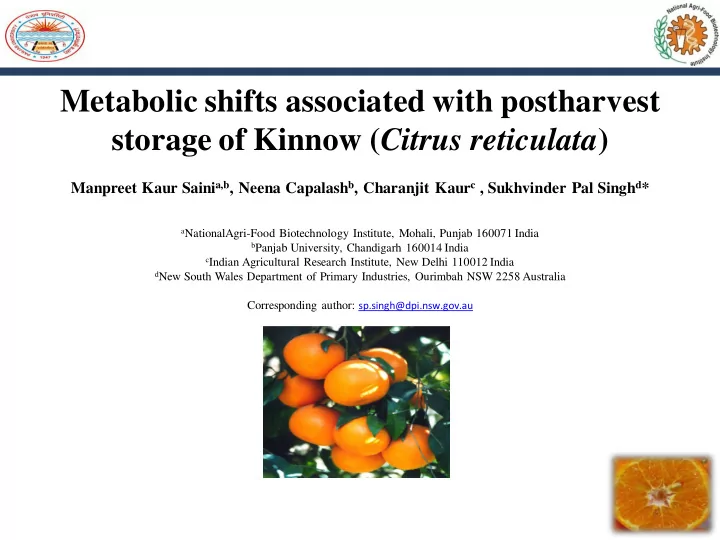

Metabolic shifts associated with postharvest storage of Kinnow ( Citrus reticulata ) Manpreet Kaur Saini a,b , Neena Capalash b , Charanjit Kaur c , Sukhvinder Pal Singh d * a NationalAgri-Food Biotechnology Institute, Mohali, Punjab 160071 India b Panjab University, Chandigarh 160014 India c Indian Agricultural Research Institute, New Delhi 110012 India d New South Wales Department of Primary Industries, Ourimbah NSW 2258 Australia Corresponding author: sp.singh@dpi.nsw.gov.au
INTRODUCTION • Management of temperature is a critical factor for maintaining postharvest quality of citrus fruit. • High temperature increases respiration rate, decay incidence, physiological loss in weight and reduces nutritional quality and flavour. • Low temperature storage helps arrest the changes in flavour and extends shelf life and maintains high flavour and quality in mandarins. • Significant changes occur in Kinnow metabolome due to storage temperature and duration, thus affecting organoleptic quality and consumer acceptability of the fruit.
INTRODUCTION Kinnow fruit metabolome • Several thousand low molecular weight (MW < 1000 Da) organic molecules. • Diversity in abundance, polarity and biochemical properties. • Metabolites Relevance. • Taste: Sugars, organic acids, phenolics • Aroma: volatiles • Nutrition: vitamins, bioactives • Processing: limonoids • Color: carotenoids, flavonoids • Exploitation of biosynthetic pathways for quality improvement.
OBJECTIVES To investigate the effect of storage temperature and duration on flavour, nutrition and processing quality of Kinnow in terms of: • primary metabolites (sugars, organic acids, vitamins) • secondary metabolites (flavonoids, phenolics, limonoids, aroma volatiles)
MATERIAL AND METHODS Sample collection • Commercially mature Kinnow was harvested from random trees when fruit attained soluble solids to an acid ratio (SSC/TA) higher than 13. • Harvested fruit was divided into two different groups which were stored at two different temperatures: ambient temperature (28 ºC) and low temperature (5 ºC) with relative humidity between 90-95%. • The fruits were sampled after 7, 14, 21, 28, 35, 42, 49 and 56-days of storage interval. • The fruit stored at a 5 ºC lasted 56 days but fruit stored at 28 ºC lasted for 28 days only.
MATERIAL AND METHODS • Targeted Analysis of primary and secondary metabolites a) LC-MS/MS based targeted profiling of non-volatiles. Sample extraction according to metabolite of interest. Separation, Identification and quantification of metabolites using LC coupled to Sciex 5500 QTRAP system. Multiple reaction monitoring (MRM) mode was utilized for qunatification. Sugars, acids, vitamin B-complex and C, flavonoids, phenolics, limonoids were quantified. b) GC-MS based targeted profiling of volatile metabolites. Extraction was performed using SPME fibre . Agilent 7890 GC equipped with 7000 B MS detector will be used. Scan range- 40 to 750 m/z.
MATERIALS AND METHODS SAMPLE COLLECTION & PROCESSING SAMPLE PREPARATION SAMPLE ANALYSIS Targeted analysis QUANTIFICATION MULTIVARIATE ANALYSIS (PCA, HEAT MAP) Heat Map PCA (score plot & loading plot)
RESULTS Influence of storage duration and temperature on sugars in ‘Kinnow’ juice.
RESULTS Influence of storage duration and temperature on organic acids in ‘Kinnow’ juice.
RESULTS Influence of storage duration and temperature on vitamin C in ‘Kinnow’ juice.
RESULTS Influence of storage duration and temperature on limonin and limonin glucoside in ‘Kinnow’ juice.
RESULTS Influence of storage duration and temperature on non-volatiles in ‘Kinnow’ juice. MIN MAX RT LT
RESULTS Influence of storage duration and temperature on aroma volatiles in ‘Kinnow’ juice. MIN MAX LT RT
RESULTS PCA score plots showing segregation of samples due to aroma volatiles(A), and non-volatiles (B) as interaction of storage duration and temperature. A B
CONCLUSIONS The study entails a comparative evaluation of primary and secondary metabolites in ‘Kinnow’ stored at ambient and low temperature storage conditions. Glucose and fructose showed an increasing trend at ambient temperature; however values reached a plateau by 14 days at low temperature. A significant decline in organic acids, vitamin B-complex and vitamin C, was observed during storage; although the decline was rapid at ambient temperature than low temperature. High limonin levels were observed in fruits stored at ambient temperature as compared to low temperature. High aroma profiles, coupled with low organic acids were suggestive of high off flavour and quality impairment in Kinnow fruits stored under ambient conditions. Based on metabolites, it seems that ‘Kinnow’ fruits can be safely stored till 6 weeks at low temperature without any impairment in quality. Thus, quality of fruits stored at different temperatures suggests a strong need for low temperature storage for maintaining high quality of Kinnow.
ACKNOWLEDGEMENT
Thank You
Recommend
More recommend